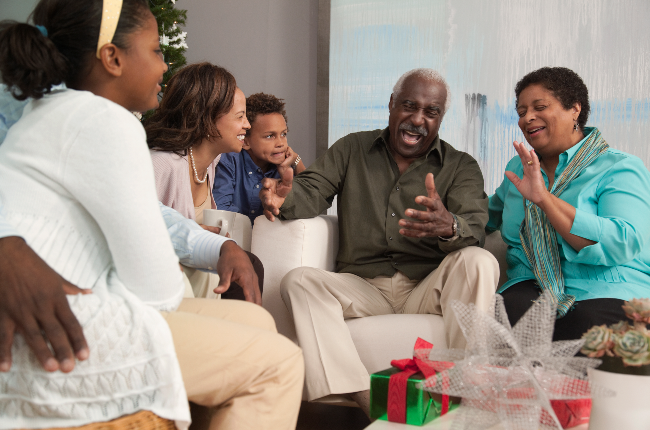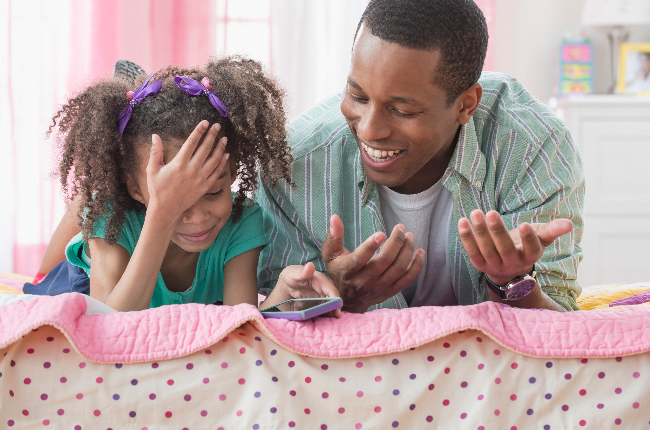
"Want to hear a joke about paper?" I ask. "Nevermind, it’s tearable . . ."
As if to confirm the punchline, my daughter rolls her eyes and says, slowly, and unironically, "Daddy. That. Is. Not. Funny."
Undeterred, I try another, a classic: "Do you know how you make a tissue dance? Put a little boogie in it!" She sighs.
"That is not a classic," the eight-year-old says, then puts her headphones back on and announces she’s going back to watching YouTube.
I had hoped, perhaps unrealistically, that my audience of one for my dad jokes would be around a bit longer than age seven.
But kids, they grow up so fast, don’t they?
Dad jokes, though, never grow up. They’re practically eternal, passed from generation to generation, growing cornier with age.
You might like| 5 things we learnt about our bodies as children that are actually totally wrong
And now that my wannabe tween is at an age where she’s beginning to understand embarrassment, it’s my time to shine.
The appeal of dad jokes – to fathers, anyway – is simple. It’s a chance for us to stop pretending to be grown-ups with boring responsibilities, and tell goofy, punny jokes, which rarely fail to make little kids laugh.
And who doesn’t enjoy having an audience that genuinely finds your jokes hilarious every time?
When they’re little, it’s the easiest thing in the world to amuse kids. All you need is a hand or two to hide your face, and you’re guaranteed delighted giggles at the most basic of magic tricks.
As they get older there are dinosaur jokes, pirate jokes, animal jokes and knock-knock jokes, and it’s an unexpected thrill introducing these groaners to an audience that finds them fresh, funny and wildly original.
Before you know it, and this happens to all kids, they discover humour of the, uh, scatological variety. Did they get it from us? From too many cartoon shows? From their preschool peers? It doesn’t really matter, because poop jokes are the best.
What do you call a fairy using the toilet? Stinker Bell!
What’s brown and sticky? A stick.
See? Eventually we become like lazy comedians who rehash their gags – if it gets a laugh, it stays in the set, and we get kind of addicted to our own bad dad jokes.
We may even believe that we’re actually funny guys . . . The trouble, of course, is that kids grow up and, most of the time, so does their sense of humour.
Those toilet gags are the best when they’re in the throes of potty training, and they figure out that it makes certain folks squeamish. But once they’ve mastered doing their business, well, it’s not so funny anymore, at least not to them.
And that’s when, like caterpillars to butterflies, dad’s jokes become "Dad Jokes" – that moment when the kids stop finding us funny.
Scientists have backed up the brilliance of this kind of humour. A recent University College London study found that these jokes land really well, especially if the person telling it is already laughing (as dads tend to do).
Another established that puns are good for the development of the brain, in kids and adults.
Research at the University of Windsor in Canada says this is because puns take a visual idea and give it a twist, which forces a connection between the brain’s two sides – the left, which does language processing, and the right, which processes visuals.
Apart from building and strengthening bonds between parent and child, dad jokes are often based on puns, word association, phonics and repetition, which unconsciously get kids thinking about words and how they’re used.
"Research shows that humour helps build stronger relationships and that the more intimate the 'in-jokes', the stronger the bond seems to be," says Elena Hoicka, a psychologist at Sheffield University in England who’s researched how parents’ use of jokes influences child development.
Then there’s the psychological effects of laughter, which are obvious, and there are physiological benefits as well.
Laughter stimulates the body’s organs by increasing oxygen intake to the heart, lungs and muscles, and stimulates the brain to release more endorphins, according to the Mayo Clinic.
It also helps people cope better with stress by easing tension, relaxing the muscles and lowering blood pressure. It relieves pain and improves mood and it can help strengthen the immune system.
Take that, dad-joke haters.
Read more| Instagram account reveals the funniest things kids say – and we can’t stop laughing!




 Publications
Publications
 Partners
Partners


















